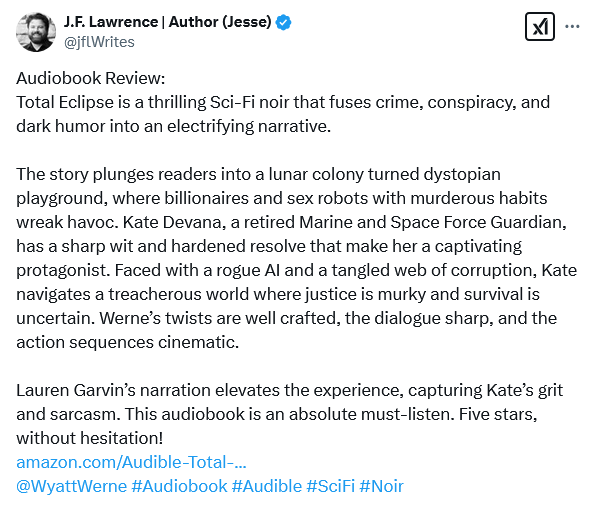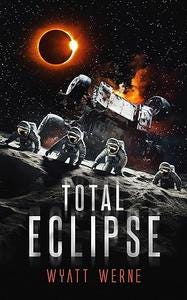This is an inside baseball newsletter about the writing process. If you are here for the fiction, skip down to the break and read the latest review for Total Eclipse, then share it. Five stars!
Chapter 26 of Devana Files comes out in a week. Stay tuned, too, for the title/cover reveal and release date in the summer of 2025.
More on that quote later. Today’s post is about writing advice. I don’t like writing about writing because authors’ opinions about writing rules are like assholes: We all have them; they all stink. So be careful what you're sticking your nose into.
I am seeing a lot of spammy writing advice on Subtack. Fact: The number one theme in Substack’s “fiction” category is not actual fiction. It’s writing about writing. This is true of Youtube and social media generally, but Substack seems to be bloated with it.
So here we go on our little adventure, one that will surely end with you in the comments, pissed off. I will not censor comments, not even from trolls. You are entitled to your opinion.
Much of the Substack advice is very clickbaity. "The secret to sales is a catchy title and a good cover to sell a book. Subscribe or buy my book to find out more!" or "My Save the Cat personal writing journey!"
Free advice is typically worth what you paid for it. Sure, there are gems. Sometimes, you find a priceless piece of history at a flea market, too.
Is writing advice worth a "subscription to my unabridged opinions?"
Probably not. Here are some exceptions.
I am putting the comment button right here because as the hate flows through you, you will need to press it.
Listen to Gatekeepers
I feel your hate flowing already. Nooooooo Wyatt, we hate gatekeepers!
We do. Hear me out.
Here is an entire thread on X about what an editor wants to see:
It bombs all the Usual Suspects™️: Passive voice, infodumps, cliches, etc. I bet you can name them all by heart. I am not endorsing this editor or publication or his rules. Not my point.
Trad publishing has rules, some of them dumb, like, “Don’t start a novel with the character waking up.” I just read a bestseller where the novel starts with the character waking up. Yes, that author can get away with it because they’ve sold zillions of other books.
At my dayjob (writing/reviewing extremely mathy technical papers), I rigidly enforce active voice because we submit them to an audience who cannot, under any circumstances, be confused about who did what, when, where, why, and how. I am the gatekeeper. Business writing should always be done in active voice. Period. And if you send me a paper in passive voice, I will return it severely and harshly redlined, with few exceptions.
But fiction is not business writing, and there are certainly times in fiction when passive voice is acceptable. Some cultures, out of deference to authority, heavily use passive voice. Sometimes, the character doesn’t know who left the bloody knife on the floor.
Here is the thing: if you want to submit to a publication or agent, you need to follow their rules. If an editor does not like gratuitous violence, don’t complain if you submit horror and it’s rejected. If an editor does not like passive voice, avoid it. If an agent does not like infodumps, don’t do it. If the submission criteria say 5000 words, don’t give them 5001.
You can say its not fair, hypocritical, arbitrary, untrue, whatever. Nothing changes the fact that agents and editors get 237 submissions for every 5 manuscripts they accept. They are the gatekeepers. It's their rules; they make them up.
Bottom line: If you want to raise your odds of being accepted, find out what the rules are for your submission and follow them.
Listen to successful authors
Has the source of the advice sold books (scripts, etc)? Have they received good reviews? Or have they chiefly sold “how to sell books?”
Equally importantly, is the advice applicable to books in the genre you want to write?
Harlan Coben and Lee Child videoed a Masterclass. Take it. Stephen King wrote On Writing: A Memoir Of The Craft. Read it. Kurt Vonnegut, Elmore Leonard, and many others have offered writing advice. Read it all.
Not all of it will apply to you. Advice that applies to literary fiction, for example, will not apply to thrillers. In a thriller, incomplete sentences and comma splices are common. Sometimes they’re used to overcome the aforementioned “was” passive voice. Sometimes, to break long sentences; to make the text more punchy. Your text should have a rhythm, like poetry.
Conversely, don’t listen to bloggers who specialize in “how to sell books.”
Bottom line: Mimic success in your genre.
Ignore your English professors
Ooooh, now the hate is really flowing, I see. Goooood. Let the hate flow through you.
Some of the worst writing I have ever seen has come from MFAs (some good stuff, too; I am not lumping everyone together).
English professors may be the single worst source of literary advice on the planet. I said what I said and will repeat it louder: English professors are the single worst source of literary advice on the planet. I am reminded of Michael Crichton's experiment at Harvard when he submitted an Orwell essay and got a B-.
Yes, I was one of those geeky STEM majors. Yes, I got As in my writing courses and wrote for the college newspaper. So what?
Oh, so you plan to bully your readers and impress them with how smart you are! Your audience will probably not consist of English majors who appreciate your 36-word sentences and flowery use of multi-syllable, rarely-used adjectives that they need to look up in the Oxford English Dictionary. Fuck that, your thriller reader will skip it. Of course, your literary fiction reader will love it! So know your intended reader.
Bottom line: It’s more important to know your audience than listen to floofy professorial advice. When I say, “Some of the worst writing I have ever seen has come from MFAs,” it is invariably because the writer followed “the process” and “the rules” while ignoring their audience.
Again, I resort to business writing (and I am including journalism here) as the quintessential example: You want to write at the 10th-grade level, in the active voice, telling them who, what, where, where, why, and how upfront. Not hard. You don’t need an MFA for it. Michael Connelly, Michael Crichton, John Grisham, and Freida McFadden (among others) wrote (and are writing) outstanding thriller series—and not in flowery prose. Follow their lead.
Take Grammarly, ProWritingAid, and other software with a ton of salt.
70% of the time, Grammar and style checkers work every time (to paraphrase Anchorman).
I use both Grammarly and PWD. They disagree on comma placement. PWD will sometimes tell me, “don’t do that,” when exactly what I want to do is that, for emphasis.
Software style checkers are based on the law of averages: “The average author would do this here,” based on it’s training data.
Sometimes it’s solid advice. Other times, it isn’t. Use discretion.
I suggest reading your work aloud (or having someone read it to you). Hear the rhythm, or lack thereof, and adjust accordingly.
Listen to your editors and beta readers
Mrs W constantly reminds me: “You know what you mean, Wyatt, no one else does.” 😂
"This sentence sounds like you're describing a prolapse, Wyatt" is the kind of feedback you want from a beta reader or editor (yes, true story, a beta sent me that 😂).
The advice your editor is giving you is worth its weight in platinum. The advice your reader is giving you is worth a thousand times that. If they are telling you they are confused, can’t picture that scene, or a paragraph does not work, then you should listen and fix it.
Mrs W draws frowny faces in my drafts (she prefers to read my manuscripts in print). You bet I listen! She is meticulous. Also, I love sex. ❤️
Bottom line: Following the process and the rules is never a substitute for appreciating the impact on your reader.
Finally: The law of diminishing returns.
While you should absolutely absorb craft, you’ve probably absorbed too much.
10,000 hours of woodworking videos don't add up to a sculpture. You need to pick up a knife and go out and carve your first failures. Destroy some wood. Write a prolapse. Then, find editors and beta readers who know your genre, who are invested in you, and listen to them.
Filled with hate?
I want to thank J.F Lawrence for the review of the Total Eclipse audiobook. I am very humbled and glad he enjoyed it. Lauren did an amazing job narrating. She swears well!
Total Eclipse is available an ebook, paperback, and audiobook from Amazon and Barnes and Noble:
Finally, don’t forget we are 25 chapters into Kate Devana’s next electrifying adventure. Stay tuned for the cover reveal and release date in summer 2025.
Catch up here:
Kate Devana Files: Table of Contents
Space 2074: The lunar colony is the new Wild West. Sheriff Kate Devana goes off-colony to wrangle a fugitive con artist who bilked retirees for billions and is escaping for Mars on a deep space supply shuttle. But back home, robots are glitching, killing people, and she is the target of a corrupt Federal Agent looking to avenge the death of his former p…








